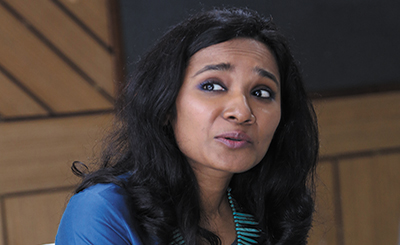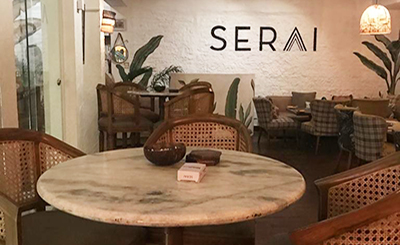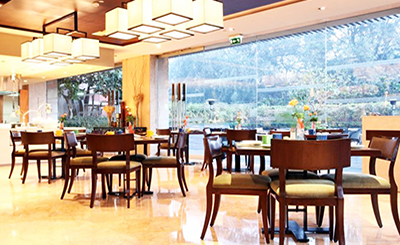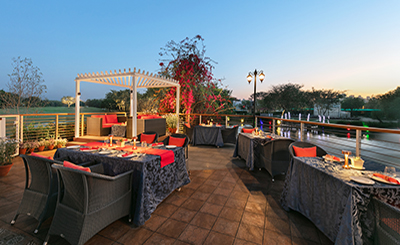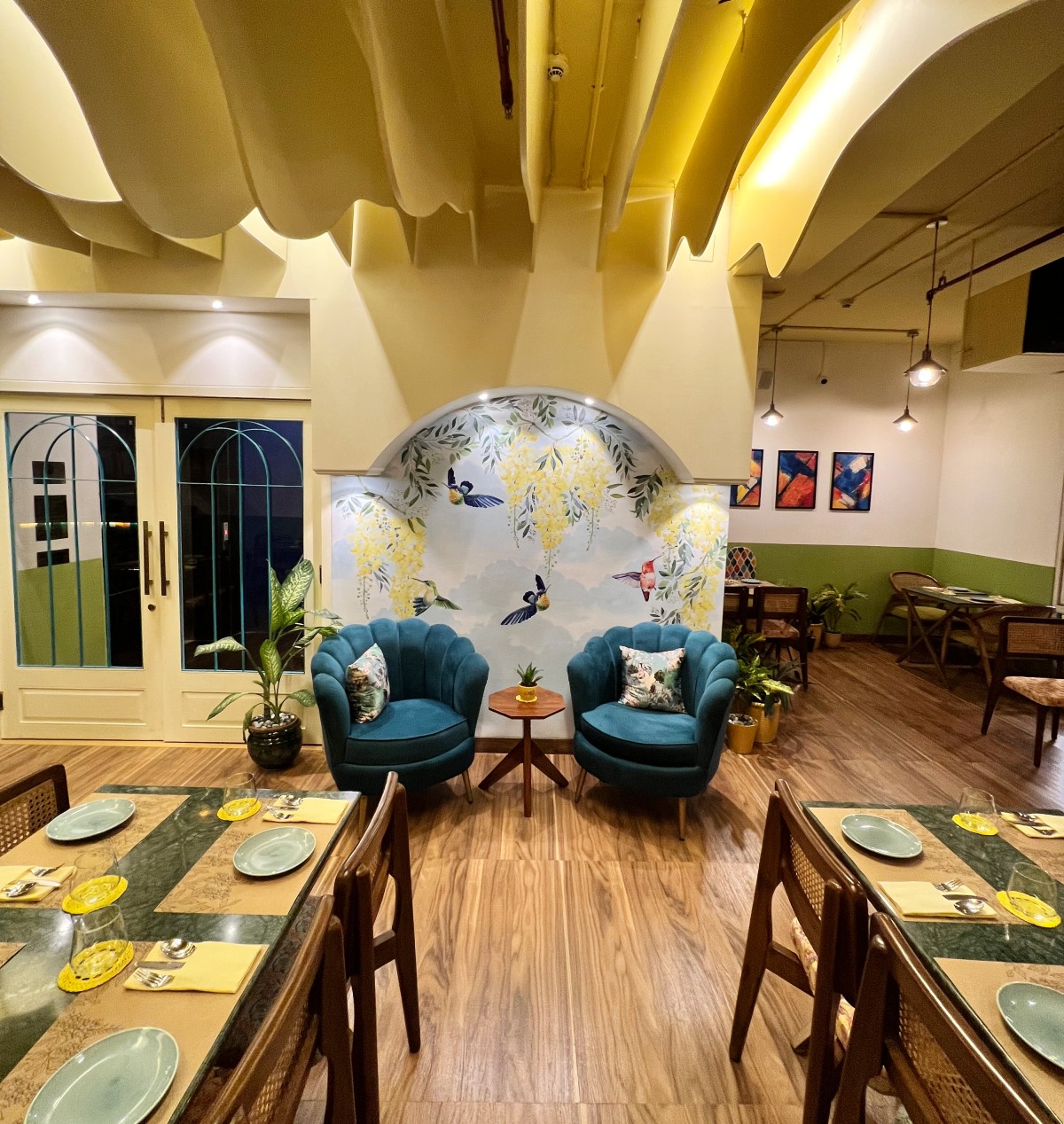
Amaltas: Indian Tapas & Bar at GK-2, M Block Market, New Delhi. Photo: Shireen Quadri
Amaltas: Indian Tapas & Bar, a trendy and chic restaurant in the heart of South Delhi, seeks to Indianise the Spanish concept of tapas, using desi ingredients to rustle up delish fares, with twists on various dishes through tweaking ingredients
The pandemic helped Delhi-based lawyer-turned-chef Udit Maheshwari and wife Subha realise their entrepreneurial dream to become restaurateurs. In 2020, when the coronavirus pandemic was raging around the world, they got together to start a cloud kitchen playfully named Pitaara Kitchen, with an aim to bring the richness of India’s regional food to the doorstep of those who craved for it. Named after the quintessential Indian bamboo wickerwork pannier basket, which evokes an old-world charm, the delivery kitchen was started with the aim to provide a novel experience to people wanting to order in ‘genuine Indian food.’
The handmade pitaara, made of willow or straw, is a product of industriousness and craftsmanship. Pitaara Kitchen is driven by similar ethos elevated by dint of workmanship; it embodies the promise of new flavours with underexplored ingredients — locally grown and diligently sourced from the distant corners of the country — ‘lost’ recipes and traditions that have slipped into relative obscurity, eclipsed by culinary imports from the West. The success of Pitaara has encouraged the husband-wife duo to come up with a trendy and chic restaurant, Amaltas: Indian Tapas & Bar in South Delhi’s posh GK-2, M Block Market.

Chef Udit Maheshwari and Subha got Amaltas: Indian Tapas & Bar up and running in record five months. Photos: Amaltas: Indian Tapas & Bar
Tapas are the small appetizers/snacks, usually consisting of savoury items like assorted seafood, meat, cheese and bread, in Spanish cuisine: The Spaniards’ penchant for hopping from bar to bar, and from tapa to tapa, across lively streets during parties has made the culinary pastime popular among foodies looking for gastronomic offerings. Amaltas: Indian Tapas & Bar seeks to Indianise the concept of tapas, using desi ingredients for delish fares. “Spanish tapas allow people to try a couple of dishes at one place and then hop onto another place. They are the best way to bring people together for conversations over good food,” says Chef Udit.
Bucking the trend with Pitaara Kitchen
With Pitaara, Chef Udit set out to buck the trend, at many levels. For a long time, modern Indian food — a distinctive fare which has heterogeneous avatars, informed by the country’s diverse food habits varying from region to region — has been relegated to the niche position in the fine dining circuit. Pitaara was launched with an objective to make it palatable and accessible to everyone. Chef Udit’s mission has been to introduce and popularise flavours that are, at once, familiar and appealing.
The other elements of Pitaara’s brand positioning have to do with its emphasis on sourcing ingredients indigenously —
so even Parmesan, for instance, is India-made — its concern for ecology (delivery packages use zero plastic and the cutlery is made with sugarcane pulp), and its focus on the grains not so commonly used at the fine dining destinations you frequent: Samak/barnyard millet, ragi, bajra, etc.
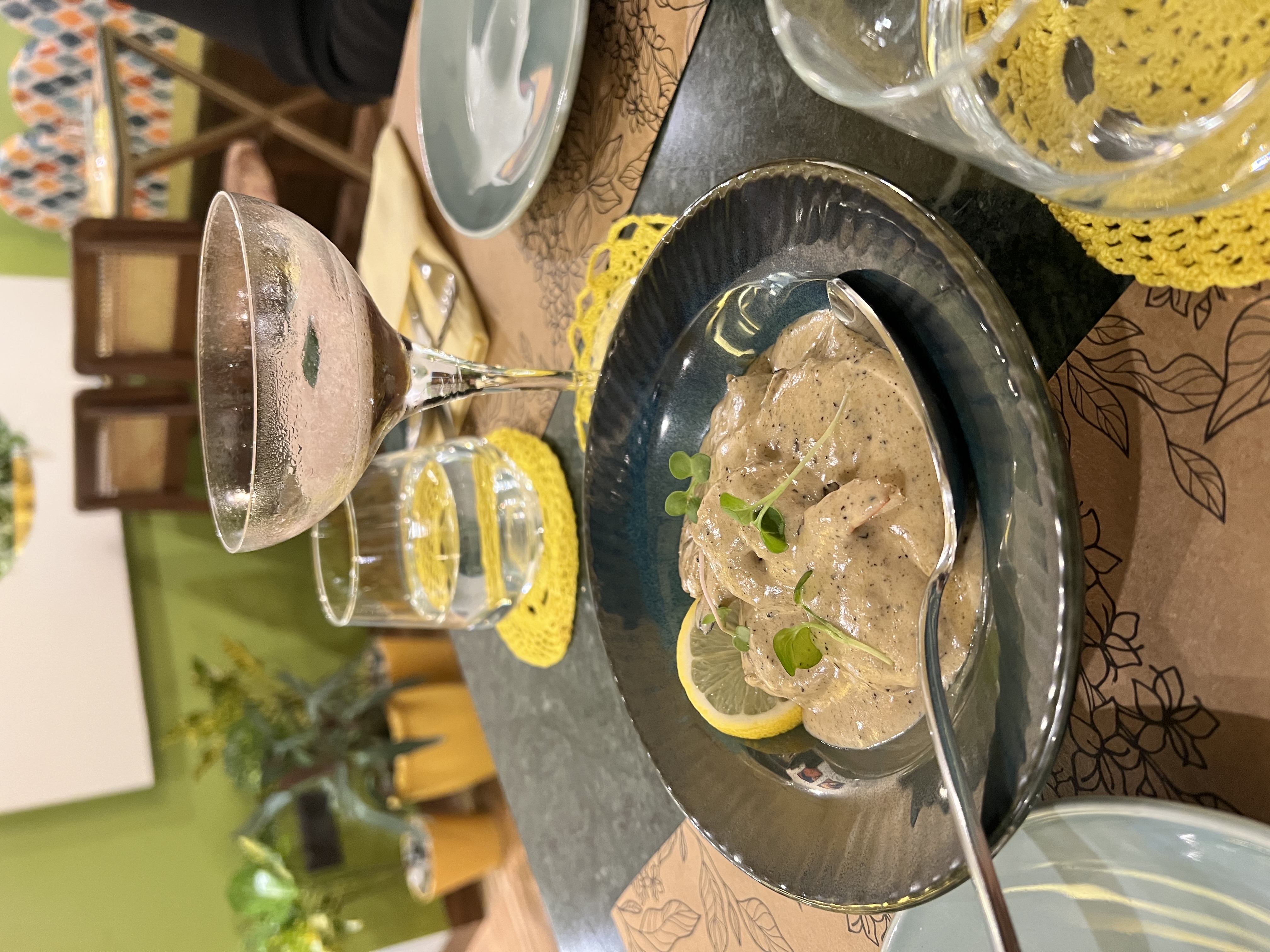
The smoky Lebu and cream prawns, with a dash of gondhuraj lebu sauce, and Kokum Sour, prepared with pineapple, homemade kokum syrup, himalayan pink salt and kaffir lime. Photo: Shireen Quadri
Some of Pitaara’s signature dishes include Dogri Meat from the Dogri community of Jammu; Bandel Cheese Kulcha that uses crumbly and smoky cheese from Bandel (West Bengal), an erstwhile Portuguese colony; Wild mushroom stew that draws its inspiration from Syrian Christians of Kerala; and Recheado Potatoes that takes the fiery and tangy Goan condiment to another tangent.
The new culinary couple in town
Chef Udit, who trained in French cooking from the Le Cordon Bleu (London), considers Indian food to be his forte. Delving into the vastness of regional Indian cuisine and reworking with ingredients to create different versions is what he is passionate about. Subha, who comes from an event management background, is the co-founder.
Talking about the genesis of the restaurant’s name, the duo said that they wanted to keep a name that was Indian, reminiscent of Delhi and evoked nostalgia and charm. Right outside their bedroom window, there is a huge Amaltas tree and it’s a sight to behold during the Delhi summers. At its peak bloom, it’s ablaze like a yellow orb: it’s all bright and energetic, painting the summer palette with mesmerising shades of yellow and green. “Old Delhi folks remember this tree with a lot of nostalgia as Delhi used to be covered with Amaltas — yellows everywhere. There are stretches in Delhi that have Amaltas lining both sides of the road. During summers, the ground is a carpet of yellow. Amaltas is the best thing about Delhi summers apart from mangoes,” says Subha.
Chef Udit adds that there is an international variant of Amaltas found abroad. “So, in a way, it symbolises the core Indian-modern ethos that we believe in. When I think of Amaltas, I imagine a treeline avenue, with people looking out of their windows. Here, at the restaurant, I often look out of the window during my free time; there’s ample greenery and it’s therapeutic,” he says.
The couple’s idea for Amaltas was to create a place “where time stands still.” Subha says: “On a slow summer day or a fleeting winter evening, you can sit at the window table and relax looking out at the balmy sun. We want people to come here as they are and relax over good food and conversations with friends and family. The idea is to make this space a comfortable abode for people to chill out.”
The focus on Indian food
Though Chef Udit has trained in French cuisine, he is more inclined towards Indian food — it’s his forte. The inspiration behind making Amaltas: Indian Tapas & Bar a modern Indian kitchen comes from different regions as well as the international cooking styles that he has absorbed and assimilated into his method. He has been successfully exploring Indian flavours and ingredients to create interesting versions that have been cherished by foodies. For Amaltas, he plans to keep his focus on Indian food only. “My plan was always to work around Indian food. Even when I went to the French culinary school, my aim was to learn how to cook so that I could make Indian food. My bigger aim was to use Indian ingredients in what I cook. I think I would eat Indian food every day if I could,” he says.
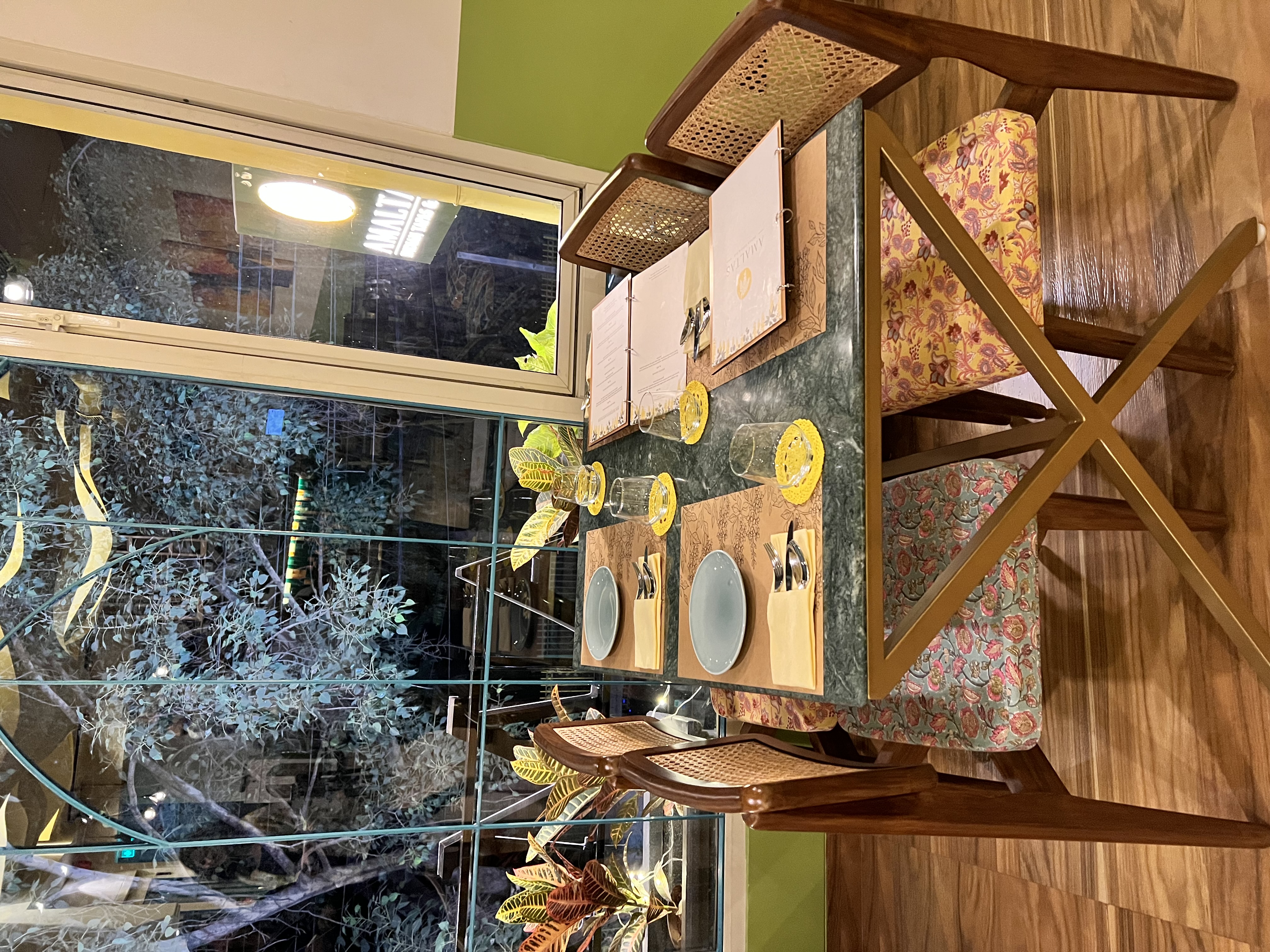
The restaurant’s décor also boasts of pretty yellow handwoven crochet coasters and teal-coloured crockeries, fabric wallpapers, and Amaltas leaves on disposable mats. Photo: Shireen Quadri
Chef Udit recollects what another chef had told him a long time ago: “The future of Indian food lies not in revamping dishes, but in revamping ingredients.” A look at the Amaltas menu reveals that Chef Udit is not redoing dishes, but redoing ingredients. In Kachampuli chicken wings, for instance, bone-in chicken wings are tossed in a kachampuli, the dark vinegar made from the ripe fruits of the Garcinia gummi-gutta tree found in the evergreen forests of Coorg, and curry leaf sauce. The dish remains the same, but what alters its taste for the better is the rejigging of the ingredients.
“We work with Indian ingredients, but let the flavours be as they are to give an Indian experience that you may not get elsewhere. A few dishes on the menu are cooked in tandoor, an essential part of the kitchen here,” says Chef Udit.
The couple are trying to position Amaltas: Indian Tapas & Bar as a restaurant that is accessible, both food-wise and tariff-wise. The soothing ambience is a bonus. Chef Udit highlights two things that he deems an essential prerequisite for a restaurant: the food has to be cravable and affordable. “It should be good enough to bring back repeat customers and affordable enough to bring them whenever they have a craving. Modern Indian kitchens have to be approachable; if we want to push and promote Indian food, we need to put an extra effort. The menu should appeal to all age groups,” he says.
The couple are keen to push the boundaries when it comes to the dining experience. At Amaltas, you will also get comfort food: from dumplings and tingmo to meat bhaji and chaat papdi. Their aim is to make you comfortable. Indian food has perennially been associated with Dal Makhni and Shahi Paneer; the two never go out of vogue as far as food trends are concerned. At Amaltas, you will get to relish them, too. “We are trying to put on the menu what the common people across India eat and not just Mughlai food,” says Chef Udit. “Unlike many Indian restaurants, we want people to try small portions of five-six items, which are easy on their pockets while they get to enjoy a diverse variety of food,” he adds. The two young foodpreneurs plan to travel across India and bring some of the most exotic ingredients and cuisines to their kitchen someday. “Indian cuisine is extremely diverse. If I’m thinking of a dish and my mouth starts watering while conceptualizing, it has to be on the menu,” says the chef.
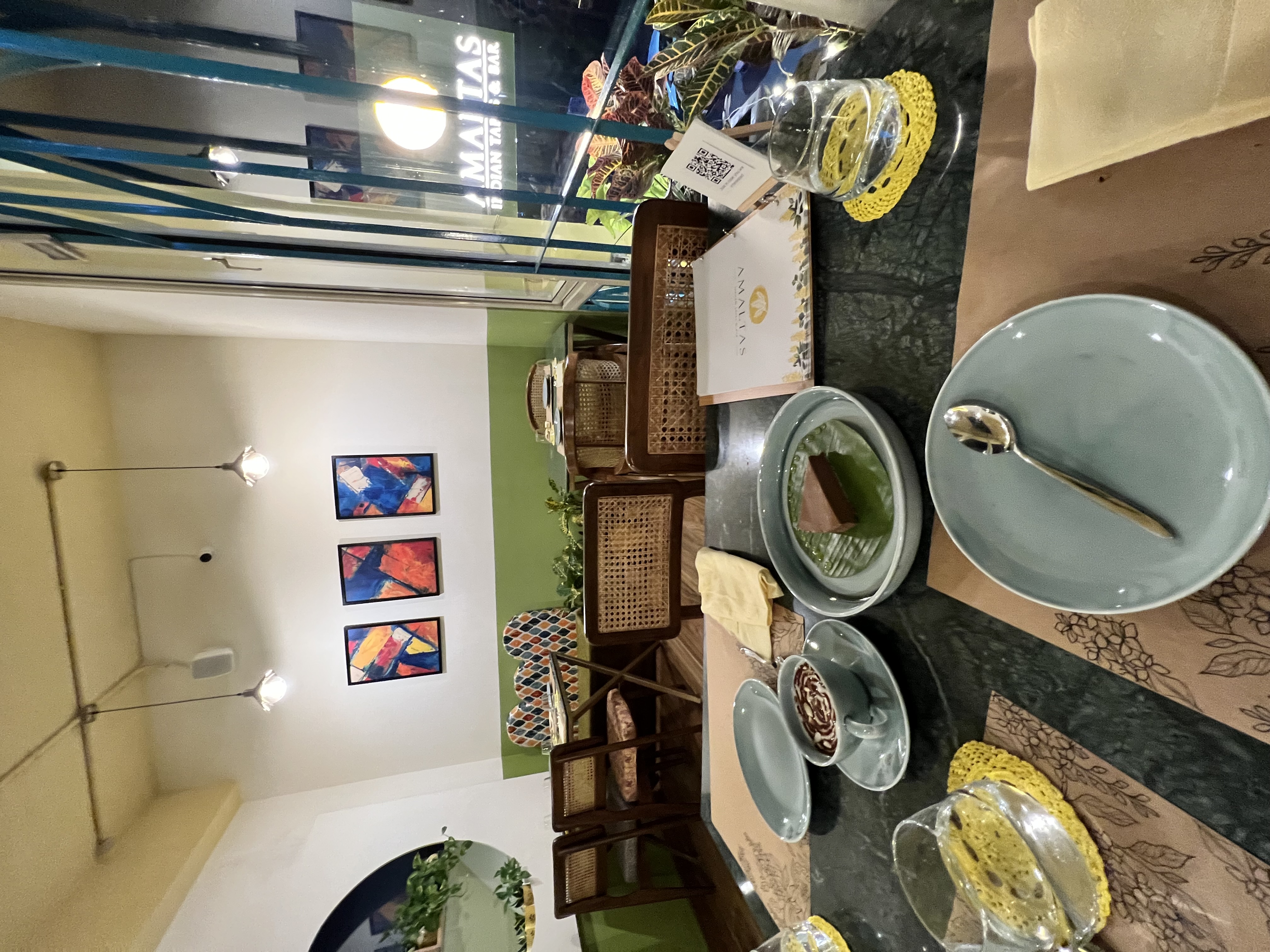
Salted Caramel Kheer, Barnyard millet cooked in milk and topped with jaggery-salted caramel garnished with almonds; Chocolate Torte, organic chocolate from the Malabar Coast on a bajra biscuit base, served with raw mango chutney. Photo: Shireen Quadri
Chef Udit and Subha got Amaltas: Indian Tapas & Bar, their restaurant up and running in record five months. But those five months were filled with discussions, deliberations, and disagreements. Together, the duo endeavoured to lend a personal touch to the interiors: walls, placement mats, crockeries and coasters. However, before everything else, there was the question of location, perhaps the most crucial of decisions. “We loved this place for the large windows; they bring in so much sunlight, brightening up the space. We wanted the restaurant to have a homely, relaxed, positive vibe — the character that is intrinsic to being modern Indian,” says Subha. The yellow fins installed to the ceiling resemble the overhanging leaves of Amaltas, with the green-yellow colour combination of the restaurant’s cosy interiors replicating the shades of the summer palette of the tree to a T. Its personalised décor also boasts of pretty yellow handwoven crochet coasters and teal-coloured crockeries, fabric wallpapers, and Amaltas leaves on disposable mats.
The fares to remember
While the restaurant will keep experimenting with new seasonal dishes, there are some fares that will be regular on the menu. One of the all-season fares that we tried was Tamarind fish curry, pan-seared tilapia smeared with tamarind-oyster sauce on a bed of tempered spinach and served with coconut-tamarind curry. It is served with appams and dudhersar rice. And both taste heavenly. In the end, let me quickly take you through some of the dishes we tried and relished.
Our gastronomic expedition began with non-alcoholic beverages: Asafoetida Sour, which is a concoction of hing, popcorn, yuzu, and pineapple and leaves a soothing aftertaste; and Kokum Sour, prepared with pineapple, homemade kokum syrup, himalayan pink salt and kaffir lime. In starters, we nibbled on Jalebi Chaat — crispy, savoury jalebis, topped with spiced yoghurt, tamarind and green chutney, with no sev — and Black Chickpea Kebabs, cooked in the griddle with clarified butter, and served with saffron flatbread, yoghurt-garlic dip and an apple salad. Jalebis are ubiquitous at Indian restaurants but the variation on jalebis Amaltas has achieved will win your heart.
The smoky Lebu and cream prawns, with a dash of gondhuraj lebu sauce, warmed the cockles of our hearts. Meat Kulcha, shredded goat meat and bone marrow in kulcha dough, cooked in the tandoor, slathered with white butter and served with garlic-yogurt dip, were utterly yummy. The Kachampuli Chicken Wings, which I mentioned earlier, proved the ingenuity of the chef’s imagination. As did the good old Tinda (Indian squash), stuffed with ricotta and reduced milk mix, cooked in a tandoor, and served in tomato and yogurt curry. I had not eaten tinda for years, but I polished it off with tandoori namak-ajwain paratha in a matter of minutes.
Tamarind Fish Curry, pan-seared tilapia smeared with tamarind-oyster sauce on a bed of tempered spinach and served with coconut-tamarind curry, which we had with appams and dudhersar rice, was a showstopper. We topped off the meal with chocolate torte, organic chocolate from the Malabar Coast on a bajra biscuit base, which was served with raw mango chutney; Salted Caramel Kheer, Barnyard millet cooked in milk and topped with jaggery-salted caramel, and garnished with almonds, left us sated and soothed.
Amaltas: Indian Tapas & Bar serves modern Indian food in innovative flavours. If you’re a foodie who loves modern Indian food in a relaxed ambience, this is your go-to-place that’ll also be easy on your pockets.
More from Culture
Comments
*Comments will be moderated






